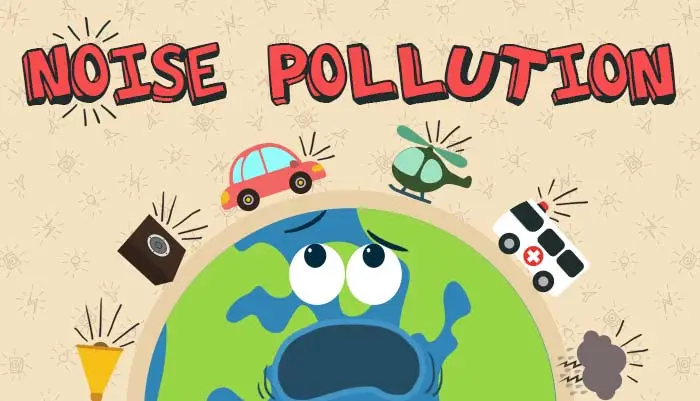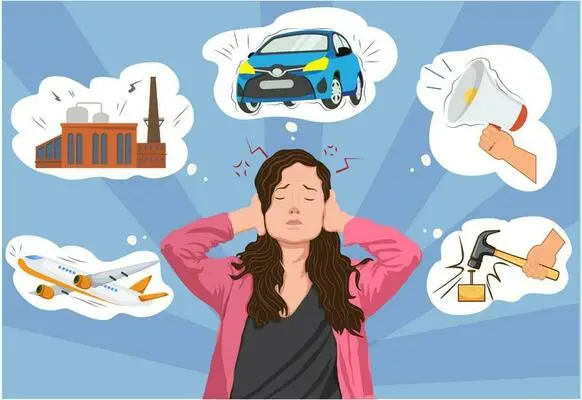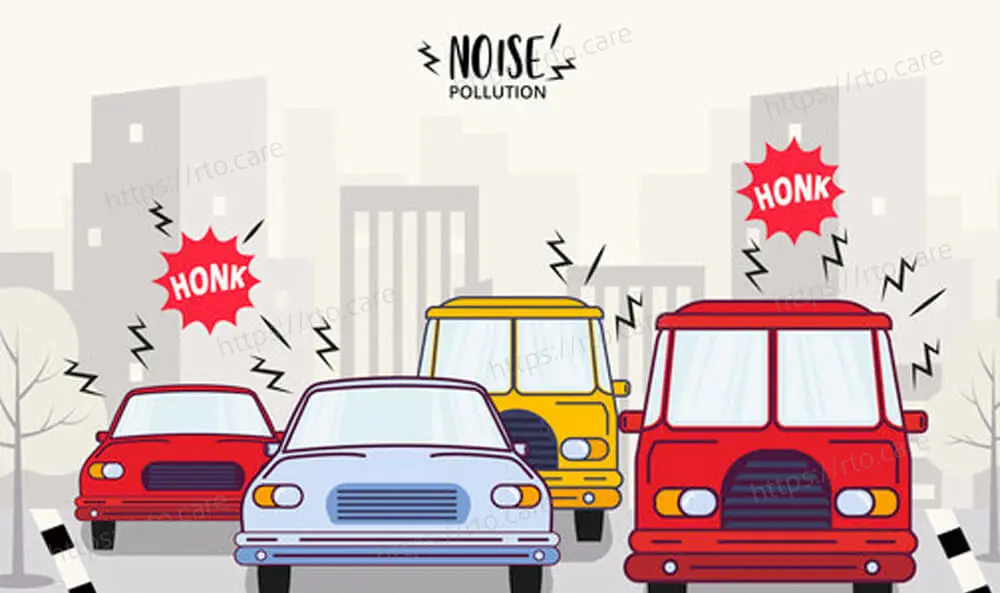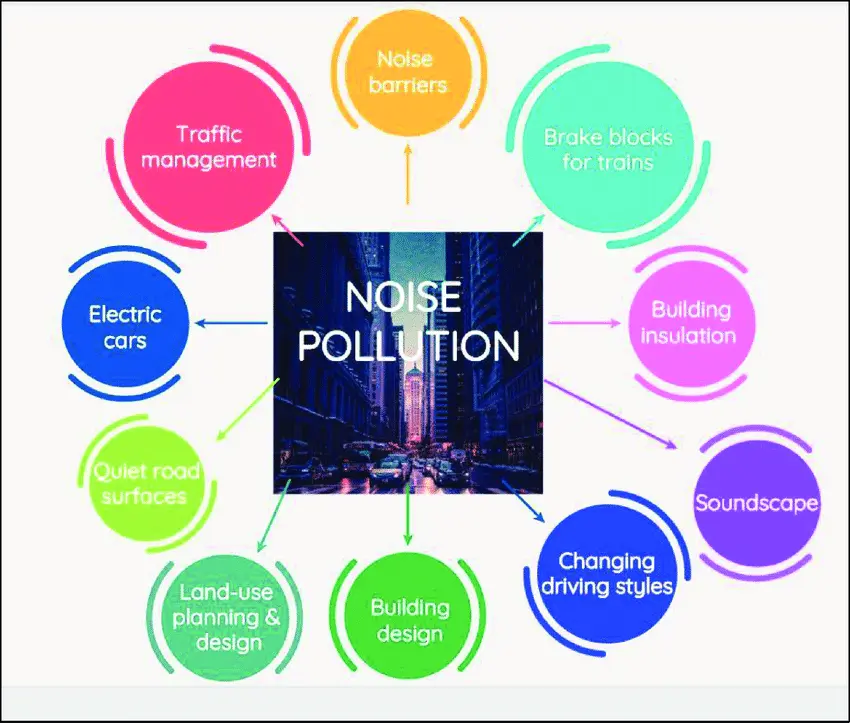
Overview
The word noise originated from the Latin word ‘Nausea’, which means sickness in which one feels the need to vomit. It is a disagreeable and undesirable sound that leads to distress in human beings. The strength of sound is measured in decibels (dB). The weakest sound that the human ear can hear is 1 Db. Due to increasing noise around the civilizations, noise pollution has become a problem of distress.
Some of its major causes are aircraft, vehicles, industrial machines, crackers, loudspeakers, etc. When used at high volume, some other machines also contribute to noise pollution, like television, radio, transistor, etc. Even electrical appliances at home have a continuous hum or beeping sound. Generally, the absence of urban planning has been on the frontline of increasing the experience of unwanted sounds. This is why understanding noise pollution is necessary to limit it in time.
Types of Noise Pollution
Man-Made
This refers to the noise produced by man-made activities. It may be anything from construction work, vehicular traffic, from the air, and from pubs and bars, or household noise, to name a few. Ranging from 30 to a huge 140 dB, this type of pollution is extremely harmful to humans. some of the man-made noises are;

Transport Noise
It mainly involves traffic which has increased in recent years with the rise in the number of vehicles. The increase in noise pollution causes deafening in older people, headache, hypertension, etc.
Industrial Noise
It is the high-concentration sound which is caused by heavy industrial machines. According to different research, industrial noise pollution damages hearing ability by around 20%.
Environmental Noise
Environmental noise discusses the kind occurring from a range of environmental activities. This can be any sound from animals to thunderstorms and can often go up to 140 decibels.
Causes of Noise Pollution on Humans and Wildlife
Several causes may contribute to noise pollution. Some of the most widespread causes are listed below.
Industrialization

Most industries use big machines capable of producing high-intensity noise. Apart from that, various equipment like compressors, exhaust fans, generators, and grinding mills greatly contribute to pollution.
The fact that we have all seen workers in these factories and industries wearing earplugs to minimize the effect tells you about the level of noise these activities produce. However, even after taking protective measures like these, extensive exposure to high levels might damage their hearing abilities in the long run.
Poor Urban Planning
In many developing countries, poor urban planning also plays an important role in causing noise pollution. Congested houses, large families who share small space, fight over parking, and everyday fights over basic facilities have all caused this type of pollution, disrupting the environment and society.
Such pollution in urban locations may also be caused when residential properties and industrial buildings are in the nearest locations. In such situations, the noise from the nearby industrial property might hamper the basic well-being of the individuals living in residential properties. Such noise doesn’t just affect their sleep and hours of rest but also hurts the development and well-being of children.
Household Chores
We are surrounded by gadgets and use them widely in our daily lives like, TVs, mobile, pressure cookers, washing machines, mixer grinders, vacuum cleaners, and dryers, coolers, and air conditioners are insignificant contributors to the amount of noise in our environment. Still, it affects the lifestyle of the neighborhood in a bad way. While this type of pollution may seem harmless, it has extensive consequences.
Social Events
It is at its highest levels in most of the social events. Whether it is marriage, pubs, parties, or places of worship, people normally break rules set by the local administration and create an annoyance in the area.
People play songs at full volume and dance until midnight and sometimes morning, making the situation of people living nearby worse. In markets, people are selling clothes by making a loud noise to attract people’s attention. While this may not appear like much at the outset, it affects the hearing capacities of the individuals constantly exposed to these sounds over time.
Transportation

Many vehicles on roads, airplanes flying over houses, and underground trains produce heavy pollution, and people find it difficult to get comfortable with that. The high noise leads to a state in which a normal person loses the ability to hear properly.
Construction Activities
Under construction activities, for example, mining, dams, construction of bridges, buildings, roads, stations, and flyovers are in almost every part of the world. These construction activities happen daily, due to constant demand for more buildings and bridges to accommodate more people.
However, while this does help us to some extent, in the long run, the it from construction activities hampers the hearing abilities of individuals exposed to this sound. Persons who are affected are construction workers, who participate in these activities, while another part of it consists of people who meet these noises either from their homes or while traveling.
Catering and Nightlife
When the weather is good, restaurants, bars, and terraces tumble outside. Late-night parties used to continue with loud music, and the needless noise made by the party mongers continued. These can make more than 100 dB.
Fatal Effects of Noise Pollution
Like other types of pollution, this pollution isn’t harmless. Here are some of the effects it can cause:
Hearing Problems
Our ears can take in a positive range of sounds without getting damaged. Any unwanted sound that our ears have not been built to filter, can cause problems within the body.
Man-made noises for example jackhammers, machinery, horns, airplanes, and even vehicles can be too loud for our hearing capacity. Continuous exposure can easily damage our eardrums and hearing loss, causing tinnitus or deafness. It also decreases our sensitivity to sounds that our ears pick up automatically to regulate our body’s rhythm.
Psychological Issues
Extreme noise pollution in working areas such as construction sites, offices, bars, and even in our homes can affect psychological health. Studies show that the incidence of aggressive behavior, disturbance of sleep, constant stress, tiredness, depression, anxiety, panic, and hypertension in humans and animals can be linked to excessive noise levels. The level of annoyance increases with increased noise, and people tend to become less and less patient. These, in turn, can cause more severe and long-lasting health issues later in life.
Physical Problems
This type of pollution can be a reason for headaches, respiratory agitation, high blood pressure, and racing pulse, and if tremendously loud, gastritis, colitis, and even heart attacks may occur.
Cognitive Issues & Behavioral Changes
Noise disturbs brain responses and people’s ability to attention, leading to low performance levels over time. Like other sound waves, too much of it goes to the brain leads to lower response rates, and reduces the brain’s ability to respond. Studies have shown that school-going children living near railway stations or airports have problems in learning, higher incidence of headaches, use more sleeping pills and sedatives, are more disposed to minor accidents, and are more likely to pursue psychiatric treatment.
Sleeping Disorders
It may not seem like much at this point, but excessively high noise levels are expected to hinder sleeping patterns, leading to irritation and uncomfortable situations. Without a good night’s sleep, you might be involved in multiple problems related to tiredness.
If a certain noise is distracting your sleep, take measures to reduce it. But in some cases, it is completely unavoidable, there are other instances (like from TV or gadgets) that can be easily avoided. Interestingly, our ears need rest for 16 hours and even more after two hours of exposure to 100 dB.
Cardiovascular Issues
Cardiovascular disease, Blood pressure levels, and stress-related heart problems are rising. Studies suggest that high-volume noise causes high blood pressure and increases heartbeat, upsetting normal blood flow. Since bringing these rates to a controllable level depends on our understanding of pollution, we must be cautious of the ill effects and tackle these situations mindfully.
Trouble Communicating
High-intensity noise can cause trouble and disturb free communication between people. This may lead to misunderstanding and difficulty in understanding the other person.
Effect on Wildlife
Wildlife faces more problems than humans because of noise pollution because they are more dependent on sound. Animals develop a better sense of hearing than human since their survival depends on it. A recent study found that man-made pollution affects many animals. The bad effects of excessive noise begin at home. Pets react more aggressively in houses where there is constant noise. They become confused more easily and face many behavioral problems. In nature, animals may suffer from hearing loss, which makes them easy prey and leads to declining populations. Others become incompetent at hunting, while some choose to migrate, disturbing the balance of the ecosystem.
Species that depend on mating calls to reproduce are often incapable of hearing these calls due to excessive man-made noise. As a result, they are unable to reproduce and cause decreasing populations. By disturbing their sound signals they get lost easily and do not migrate when they should. Animals are becoming louder to manage the increasing sound around them, which may further increase pollution levels.
A Fact sheet on Noise pollution can be seen on the following link: https://www.who.int/europe/news-room/fact-sheets/item/noise
Solutions to Prevent Noise Pollution
Awareness is essential to beat this invisible enemy. Until now, there have not many solutions to reduce sound pollution, however, governments can help in the following ways:
- Establish regulations that include corrective and preventive measures.
- Protect certain areas, parts of the country, areas with natural interest, parks, etc., to make sure noise management and reduce noise pollution.
- The compulsory separation between residential areas and sources of noise, like airports.
- Creating pedestrian areas where traffic is not allowed to enter.
- Fines for exceeding limits.
- Control the sound levels in bars, clubs, parties, and discos.
- Remove public loudspeakers.
- Encourage better urban planning as a way to create ‘No-Noise’ zones, where honking and industrial noise are not accepted.
On an individual level, everybody can help to reduce the noise in the following ways:
- Keep checking the surrounding noise levels and limiting the sounds you produce.
- Living in a green neighborhood full of trees, as trees are known to reduce sound levels from 5 to 10 dB. https://thecliment.com/trees-are-natural-defense-urban-noise-pollution/
- Reduce it in homes by lowering the volume of the music system.
- Avoiding very noisy relaxation activities and going to areas that are too noisy.
- Use appropriate absorbents in machines that make have a reverse effect.
- Using earplugs in a noisy area because it lowers the overall noise of the surroundings.
- Trying substitute means of transport such as bicycles or electric vehicles instead of taking the car.
- Getting your vehicle checked regularly and using lubricants properly so that it doesn’t produce too much noise.
- Insulate new buildings with noise-absorbing materials.

 The Climent Respect your roots, Protect your planet
The Climent Respect your roots, Protect your planet

One comment
Pingback: Urban Noise Pollution: Using Trees as a Natural Defense - The Climent